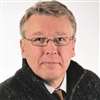Busworld 2023: Power switch continues
16 January 2024
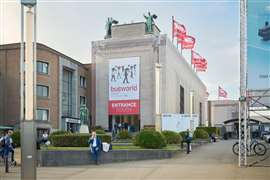
Busworld 2023 was held in Belgium towards the end of last year. Taking place for the second time at the Brussels Expo, the show featured 75 manufacturers (up from 66 in 2019) from 38 countries, with a total of 251 vehicles on display. In addition to the OEMs, the event showcased tech innovations from 451 suppliers.
Returning after a four-year hiatus due to COVID concerns, the trade fair welcomed 40,100 visitors from around the globe. As might be expected, the majority of attendees were from Belgium and other European nations, but strong visitor numbers were recorded from Turkey and China – both countries which feature considerable investment in bus and coach production. Of the total 526 exhibitors, 96 were from Turkey and 61 from China.
Around the stands
Virtually all major bus OEMs were present at the show, with Volvo Buses being the notable exception. The company’s decision not to take part in the trade show can be traced back to the announcement earlier in 2023 covering plans to halt bus body production at its plant in Wroclaw, Poland. Chassis assemblies produced by Volvo will now be delivered to MCV (Manufacturing Commercial Vehicles) in Egypt for the addition of bodies; the two companies are also set to co-develop battery-electric models.
Manufacturers taking part in the Busworld trade fair for the first time included Karadag, a Turkish OEM which largely produces city and school buses and, from the same country, Habas, which specializes in production of gas-fuel buses. JBM Group from India and Ikarus Bus from Hungary were also new to the event.
Powertrain trends
A tour of the halls at Busworld 2023 revealed that a large percentage of the new vehicles on display were city buses. And rather than diesel – or even diesel/electric hybrids – the vast majority of these new models proudly featured zero-emission battery-electric powertrains.
Busworld’s managing director Mieke Glorieux summed up the apparent overnight switch to battery power when he noted: “Between the previous Busworld and the current edition, there [were] four years due to the coronavirus pandemic. Four years is a huge timespan… the market has changed enormously in the meantime.”
With the choice of going electric or spending millions on development of diesel engines to gain marginal reductions in CO2 and other emissions, bus manufacturers have clearly opted for the electrified option. There are related benefits; battery-electric models will not be subject to upcoming Euro 7 engine emissions regulations (particulates from tyres and brakes are another issue). Additionally, electric power gains instant compliance with new ultra-low emissions zones being introduced by many major cities across Europe.
Electric buses
Companies showcasing their electromobility solutions included Daimler Buses, which presented the updated eCitaro at Busworld 2023. The 12-metre model features the new third-generation li-ion NMC3 battery packs. These power ZF AVE 130 motors described as ‘positioned close to the wheel hub’. The new packs are said to have a very high energy density. Models fitted with three packs (the previous eCitaro required a minimum of four packs) have a total energy capacity of 294 kWh.
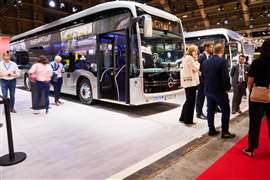 Mercedes-Benz eCitaro features third-gen li-ion NMC3 battery packs
Mercedes-Benz eCitaro features third-gen li-ion NMC3 battery packs
Also on display was the MAN Lion’s City E. This 10.5-metre all-electric city bus (also available in 12.2 and 18.1 metre body lengths) is driven by a single electric motor. This is powered by either four or five NMC li-ion battery packs with respective maximum power capacity of 320 and 400 kWh. These can deliver continuous/peak power of 160 kW/240 kW. Maximum charging capacity is 150 kW, which is reported to deliver a full recharge in between 2.5 and five hours.
The Lion’s City E further features a carbon dioxide-based air conditioning system. The new AC unit is said to be cheaper than units using conventional R134a refrigerant, while also using less energy. This helps to extend vehicle range and operating hours, while also reducing any related environmental impact.
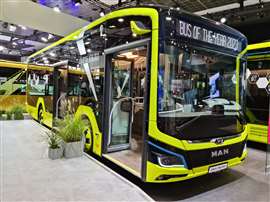 MAN Lion’s City E won the Bus of the Year 2023 award (Photo: PPI)
MAN Lion’s City E won the Bus of the Year 2023 award (Photo: PPI)
Isuzu held the world premiere of its Novo Volt at Busworld 2023. The seven-metre model uses an Allison eGen Power 100S drive system which delivers a maximum 320 kW. Battery packs have a maximum capacity of 165 kWh; while no charging rate was specified, a DC recharge is reported to take two hours. This delivers a range of about 225km.
Turkish brand Karsan presented its lineup of all-electric bus models at Busworld, including the e-Jest. According to the company, total vehicle sales have already reached 1,000 units in 22 countries. A right-hand drive version is now being launched in Japan.
Intended for shorter city routes, the e-Jest features an 88 kWh li-ion battery pack. Power output of 135 kW is delivered via a single-speed transmission to a BMW-sourced motor. Maximum recharging capacity is 22 kW (AC) and 80 kW (DC). The model can accommodate up to 22 passengers (seated and standing).
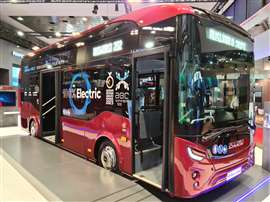 Isuzu Novo Volt can accommodate 29 passengers (Photo: PPI)
Isuzu Novo Volt can accommodate 29 passengers (Photo: PPI)
Founded in 1995, BYD was originally a battery manufacturer. Now, the China-based company has evolved into a vehicle OEM producing a variety of all-electric passenger cars and buses. At Busworld, the company held the European premiere of two models, the B12 eBus and the UNVI DD13 Intercity double-decker coach, a 13-metre model produced through a collaboration between BYD and European bodybuilder UNVI.
The B12 eBus uses the li-ion phosphate ‘Blade’ battery chassis system (where the Blade packs essentially form the chassis). This has a maximum capacity of 500 kWh, which can return a range of up to 600 km per full charge. The system features a new 6-in-1 controller featuring ‘Silicon Carbide’ technology to maximise power efficiency, which is further enhanced by the use of wheel hub hairpin motors.
Hydrogen future
While electric buses are ideally suited for operating within city limits, longer routes require something more than additional battery packs. In such cases, OEMs are planning to leverage hydrogen power to achieve the necessary range.
A series of bus manufacturers revealed plans for their respective hydrogen-power models at Busworld 2023. In one case, Caetanobus (part of Toyota Caetano Portugal) and Temsa (part of Skoda Transportation), are collaborating on development of an H2-powered model which can use fuel delivered at 350 or 700 bar (H2 Dual System). This flexibility should increase the number of potential refueling points. Total range from full could reach 1000 km.
The partners are planning to launch a two-axle hydrogen model based on the battery-electric Temsa HD12 in 2024, with series production starting in 2025. The bus will use Toyota fuel cells sourced via Caetanobus, which already has a hydrogen-fuel city bus on the market.
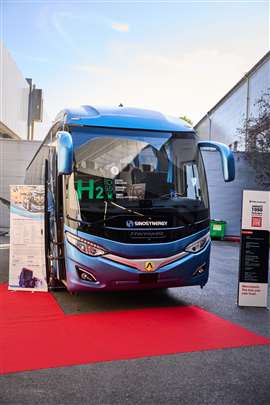 The Audace 1050 Hydrogen can be refueled in about five minutes
The Audace 1050 Hydrogen can be refueled in about five minutes
Another OEM/fuel cell provider collaboration has seen Brazilian manufacturer Marco Polo team up with China’s Sinosynergy. First shown in Europe at the IAA in 2022 and presented in the outdoor area at Busworld 2023, this coach uses two 80 kW fuel cell modules sending electricity to four lithium-iron (LiFEPo) battery packs (total 141 kWh) from CATL, which in turn drives a Danfoss motor (140 kW, peak 222 kW).
Built in China by Allenbus, the 12-metre Audace 1050 Hydrogen has a 38 kg H2 capacity at 350 bar which can deliver a range in excess of 500 km. Other key suppliers include ZF (axles), Knorr (brakes, suspension) and Eaton (four-speed transmission).
Iveco Bus presented a series of new and updated models at Busworld 2023, including the battery-powered E-Way, StreetWay Elec and Crossway LE Elec. The Italian bus manufacturer also held the world premiere of the E-Way H2 hydrogen fuel cell model.
Built with support of partner company Hyundai Motor, through that company’s new HTWO division, the E-Way is a 12-metre model that features a 310 kW motor. Fitted with four tanks which can carry up to 7.8 kg of H2 fuel and battery packs from FPT Industrial providing 69 kWh, total range is about 450 km. The model will be assembled at the Iveco bus plant in Annonay, France.
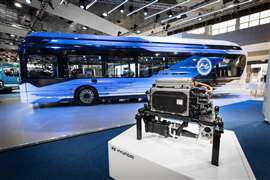 Iveco Bus E-Way H2 features a Hyundai HTWO fuel cell
Iveco Bus E-Way H2 features a Hyundai HTWO fuel cell
Staying in France – and as covered in our Busworld preview – bus manufacturer Safra held the unveiling of its second-gen HyCity hydrogen fuel cell coach. Fitted with a fuel cell module supplied by Symbio and a nickel-manganese-cobalt (NMC) battery pack from Microvast, the model uses a pair of wheel hub-mounted 115 kW motors for a total output of 230 kW. The 12-metre bus is expected to have a range of about 350 km.
Safra is also planning to launch both articulated and 18-metre versions of this hydrogen fuel bus. A preview is planned before the end of 2024. In addition, the company is set to introduce its H2 Pack, a hydrogen fuel cell retrofit kit.
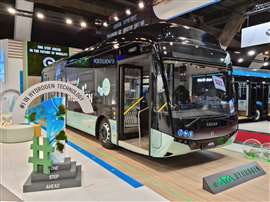 Karsan e-ATA Hydrogen is a new entry from the Turkish OEM (Photo: PPI)
Karsan e-ATA Hydrogen is a new entry from the Turkish OEM (Photo: PPI)
Another example of fuel cell power presented at Busworld was the Karsan e-ATA Hydrogen. The 12-metre bus features a 70 kW fuel cell which delivers power via a 30 kWh battery pack to hub motors with a total power output of 250 kW. Range is in the area of 500 km, dependent on load and conditions.
Lastly, Spanish company Irizar unveiled its new Hydrogen i6S Efficient fuel cell-powered coach. Few specific details for this prototype were available, although the company noted that the Hydrogen i6S would have a range of up to 1000 km and refueling time of 20 minutes. Additionally, the fuel cell stack would only require servicing after 30,000 hours of operation.
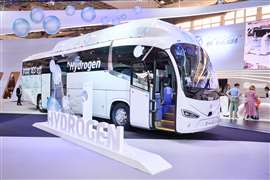 Irizar Hydrogen i6S Efficient fuel cell-powered coach (Photo: PPI)
Irizar Hydrogen i6S Efficient fuel cell-powered coach (Photo: PPI)
Versions of the i6S Efficient using diesel, biodiesel, biofuel and natural gas powertrains were introduced in May 2023. These are said to benefit from a 950 kg weight reduction and 30% improvement in aerodynamics, which should help the hydrogen variant to achieve the stated range target.
Supplier side
There were more than 400 Tier suppliers present at Busworld 2023, offering a series of technologies developed specifically for buses and coaches.
Amongst these companies was ZF Friedrichshafen. In addition to a variety of other new components, the series supplier held the world premiere of its AxTrax 2 LF electric portal axle.
Specifically designed for low-floor buses powered by battery-electric and fuel cell powetrains, the AxTrax 2 features two stand-alone silicon carbide inverters and a high-performance electric control unit. Fully compatible with ZF’s air suspension and wheel-end solutions, the compact design allows additional space for either passengers or battery packs.
Two variants of the AxTrax 2 LF will be available, delivering either 260 kW or 360 kW peak power. The more powerful of these is capable of powering an articulated bus up a 20% grade with one drive axle.
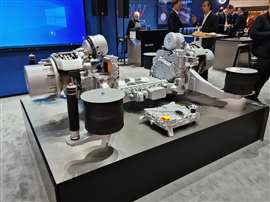 New ZF AxTrax 2 LF electric portal axle is 10% more efficient than previous version (Photo: PPI)
New ZF AxTrax 2 LF electric portal axle is 10% more efficient than previous version (Photo: PPI)
Also at Busworld, Italian company Thermobus presented a low-energy infrared (IR) heating system for city buses and coaches. Using the IR heating principle, radiant heat is transferred to surfaces (including people) without the loss of heat to the air. Where a standard fan-driven heating system would use up to 700 W/km, the IR system is said to only need between 200 and 300 W/km.
The low-maintenance IR panels are comparatively lightweight and can be mounted in the ceiling, floor or vehicle walls. They can be used as a replacement for standard water/glycol heating systems, with further savings made due to the removal of that associated weight, or in tandem with standard heating systems in very cold climates.
Elsewhere, Arcol, a Spanish manufacturer of vehicle mirrors, presented its CMS eMirror system. The standard category II and IV eMirror is comprised of two cameras and one monitor on each side of the vehicle (adding additional cameras and a monitor achieves category V and VI compliance).
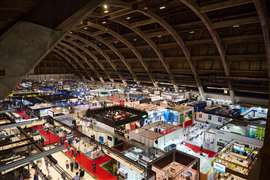 Busworld 2023 supplier hall at Brussels Expo
Busworld 2023 supplier hall at Brussels Expo
With a wider field of vision than a standard mirror to help reduce blind spots, the system is said to improve vehicle and road user safety. Total cost of ownership for fleet operators should be less due to reduced risk of accidents. Additionally, the camera system returns a better image in all conditions, including day, night and bad weather.
The next Busworld Europe trade show will be held in Brussels from 4-9 October, 2025.
STAY CONNECTED




Receive the information you need when you need it through our world-leading magazines, newsletters and daily briefings.
POWER SOURCING GUIDE
The trusted reference and buyer’s guide for 83 years
The original “desktop search engine,” guiding nearly 10,000 users in more than 90 countries it is the primary reference for specifications and details on all the components that go into engine systems.
Visit Now
CONNECT WITH THE TEAM









